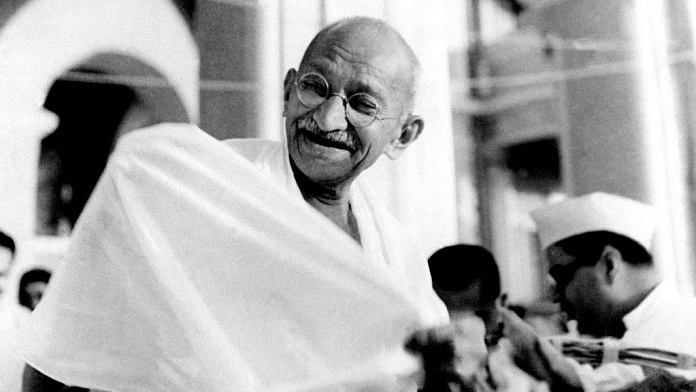The difficulty in writing about this revolves around Gandhi’s own relationship with sex, and the controversy that has followed him since his days in South Africa. Yes, I will go there. First things first:
In Hindi the word brahmacharya often translates to celibacy in English. But that is not quite accurate. Etymologically, the Hindi word stems from two Sanskrit roots: Brahma, which means one’s own higher self, ultimate reality, absolute consciousness, and the name of the Vedic god of creation, ergo Divine Creator; and charya, which means to follow, engaging with proceeding. Together, it means behavior that leads to Brahma, to stay true to one’s Self, or on the path of Brahma.
Celibacy, on the other hand, at its simplest means nonindulgence in sexual activity. The root comes from the Latin word, caelibatus, a grammatical form of caelebs (“unmarried”). It usually refers to a state of voluntarily being unmarried and sexually abstinent for religious reasons—within acts of renunciation. Throughout history in virtually all the major religions of the world, celibacy has been a part of their practices in one form or another. In other religions and cultures, celibacy is opposed, such as in the Shinto tradition. So too with most African and Native American traditions. The Romans considered it an aberration; they created laws levying monetary penalties against it. Jews and Muslims embrace marriage and family, so they denounce celibacy. In classical Hinduism, asceticism and celibacy in the later stages of life, after one has met one’s societal obligations (meaning marriage and kids), are encouraged. And Jains, more austere than Hindus and the religion Gandhi’s pious mother leaned toward (though both his parents were Vaishnavas), preach complete celibacy as the path to attain moksha, the release from the endless cycle of birth, death and rebirth, according to its doctrine.
There’s also some confusion about the difference between abstinence and celibacy which even above I use interchangeably, but they are not the same. Sexual abstinence, also called continence, is abstaining from some or all aspects of sexual activity, often for some limited period of time. Celibacy may be defined as a voluntary religious vow not to marry or engage in sexual activity. And one more working definition, critical to my assessment: asexuality. This is the lack of sexual attraction to others, low or absent interest in the desire for sexual activity, which some consider a sexual orientation. Of these, and after reading about Gandhi’s activities and thoughts about all these, I believe Gandhi had moved through several of those categories but after declaring himself brahmacharya, he shifted his energies to asexuality. As his austerities increased, moving him higher and higher into realms approaching monkhood, it’s my sense that his sacral chakra, the one located just above the pubic bone and responsible for passion, sexuality, intimacy and money, closed and his desire for sex with anyone went on complete lockdown.
His history of sexual intimacy gives more insight into how this happened, and how and why he tested his own sexual desires; and, further, how his opinions and actions on this subject affected mine.
In 1883, the 13-year-old Mohandas Karamchand married 14-year-old Kasturbai Makhanji Kapadia in Porbander, the city where their parents lived. It was a traditional arranged marriage and their youthful ages to wed were not uncommon then. He once wrote of that wedding, “As we didn’t know much about marriage, for us it meant only wearing new clothes, eating sweets and playing with relatives.” His wife stayed with her parents for some time, according to custom. Her husband, being a teenager full of male testosterone, had written that he regretted his natural lustful feelings: “Even at school I used to think of her, and the thought of nightfall and our subsequent meeting was ever haunting me.”
The sex drive is a potent potion, very difficult to ignore without a foundation of austere self-discipline. It can distract even men and women trained to a celibate life. To wit: in 2019 the United States Roman Catholic Church reported that allegations of child sex abuse by clerics had more than doubled in a 12-month period. Countries around the world see similar trends.
In 1888, at the age of 18 and a month after his first son Harilal was born, Gandhi left his wife and newborn to attend law school in London. He did not see her again for three years. Gandhi returned from England after finishing his education, but soon went to South Africa on a work assignment as a lawyer. After this, Mohandas came to India in 1896 and then took Kasturba with him. From then on, Ba, as she was known, stayed with her husband.
Gandhi carried great remorse that with his father Karamchand Uttamchand Gandhi close to death, young Gandhi, then 16 years old and his high voltage sex drive probably peaking, chose to go to his wife’s bed. As he wrote in his autobiography, “…Every night whilst my hands were busy massaging my father’s legs, my mind was hovering about the bedroom and that too at a time when religion, medical science and commonsense alike forbade sexual intercourse. I was always glad to be relieved from my duty and went straight to the bedroom after doing obeisance to my father.”
 This excerpt from Perry Garfinkel’s Becoming Gandhi has been published with permission from Simon & Schuster.
This excerpt from Perry Garfinkel’s Becoming Gandhi has been published with permission from Simon & Schuster.



